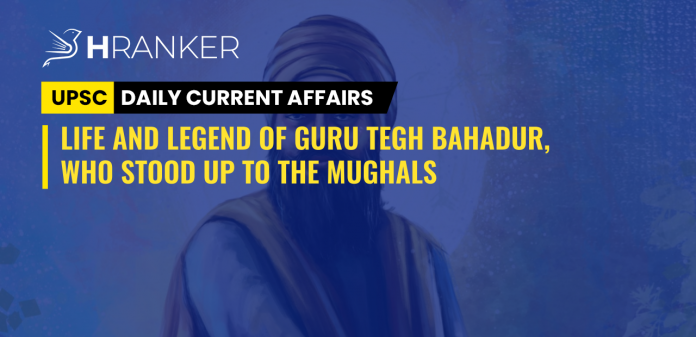WHAT’S IN NEWS: To mark the 401st birth anniversary of Guru Tegh Bahadur, the ninth Sikh guru who stood up against forcible conversions by the Mughals, Prime Minister Narendra Modi gave an address from the Red Fort on April 21,2022. Red Fort was chosen as the venue as it was the place from where Mughal ruler Aurangzeb gave orders for the execution of Guru Tegh Bahadur in 1675 and Red Fort is an ideal place to reach out the people of India with a message of interfaith peace, brotherhood and harmony.
The two-day mega event organised by the Ministry of Culture in collaboration with Delhi Sikh Guruwara Management Committee, culminated with Prime Minister Narendra Modi’s address from the Red Fort. The speech was delivered after ‘shabad kirtan’ on the ‘life and sacrifice of the Guru’ by 400 Sikh musicians. PM also released a coin and postage stamp in honour of the ninth Sikh guru.
ABOUT GURU TEGH BAHADUR (1621-1675):
- Tegh Bahadur was born as Tyaga Mal in Amritsar on April 21, 1621 to Mata Nanki and Guru Hargobind, the sixth Sikh guru.
- Tegh bahadur was married to Mata Gujri at Kartarpur in 1632.
- Growing up, Tegh Bahadur learnt Gurmukhi, Hindi, Sanskrit, and religious philosophy and was also trained in swordsmanship and archery. He grew up as a scholar who studied the Vedas, Upanishads, Puranas, and other traditional Hindu literature and a poet who made valuable contributions to the Sri Guru Granth Sahib, the holy book of Sikhism. He also wrote 116 shabads, 15 ragas, and 782 compositions, all of which were included in the holy Sikh book Granth Sahib.
- He is renowned as a warrior and saviour guru who struggled tirelessly for religious freedom. He fought against forcible mass conversions of Kashmiri Pandits and left the Mughals livid.
- He came to be known by the name Tegh Bahadur (Mighty of the Sword), given to him by Guru Hargobind after he had shown his valor in a battle against the Mughals.
- After his appointment as Guru, he traveled widely to preach Guru Nanak’s teachings. In many parts of India, he disseminated Sikh principles and established communal water wells and ‘langars’ (community kitchens for the underprivileged).
- During the travel he came to know about the hardships of the ordinary people under the Mughal rule.
- “Aurangzeb was the ruling Mughal Emperor. There were conversions, either through a government order or through coercion. When people were charged with some crime or misdemeanour, they would be pardoned if they converted.” Dr Hardev Singh, Department of Religious Studies, Sri Guru Granth Sahib World University, Fatehgarh University.
- He had founded a city named Anandpur Sahib in 1665 and here he was approached by a Kashmiri Brahmin, who sought his protection from local chieftains who had told him to convert or face retribution. The Guru assured him of protection and told them to tell the Mughals that they should first try to convert the Guru.
- He then travelled to Delhi, with no intention of converting to Islam, to protect Hindus against Aurangzeb, and was captured on the emperor’s orders along the route. He was led to Delhi by five Sikhs and was imprisoned.
- In a paper titled, ‘Who killed Guru Tegh Bahadur?’ historian Sardar Kapur Singh wrote that Aurangzeb ordered the public execution of the Guru on November 11, 1675 after he declined to embrace Islam.
- He was tortured to death and beheaded at Chandni Chowk which is now a Sikh holy premise named Gurudwara Sis Ganj Sahib. The guru’s body was cremated at Rakab Ganj Sahib Gurudwara that stands between a church and a masjid, a fitting resting place for the leader who fought for tolerance and religious freedom.
PRIME MINISTER NARENDRA MODI’S VIEWS:
Describing Guru Tegh Bahadur as “Hind di Chadar” who stood “like a rock” in front of “Aurangzeb’s tyrannical thinking,” PM said that religious fanaticism and atrocities and violence perpetrated then in the name of religion could not separate the people from their faith, and while “big powers have disappeared, big storms have passed, India stands immortal, moving forward”.
He emphasized that once again, the world is looking towards India with hope and expectation. Underlining that the country is following the ideals of the Sikh Gurus, he said that India has never posed a threat to any country or society and it thinks for the welfare of the entire world even today amid global conflicts. He made special mention of the Citizenship Amendment Act “which has cleared the path of citizenship for persecuted minorities, including Sikhs, coming from neighbouring countries”. He said that Sri Guru Granth Sahib ji is a guide of self-realisation as well as a living form of India’s unity and diversity.
He said India’s freedom from years of slavery and the country’s independence cannot be separated from its spiritual and cultural journey and Our Gurus always took social and cultural responsibility along with that of imparting knowledge and spirituality.
Tegh Bahadur‘s fight for religious rights was relentless. One of his key teachings was that one should willingly follow a particular faith and not be forced into it.




